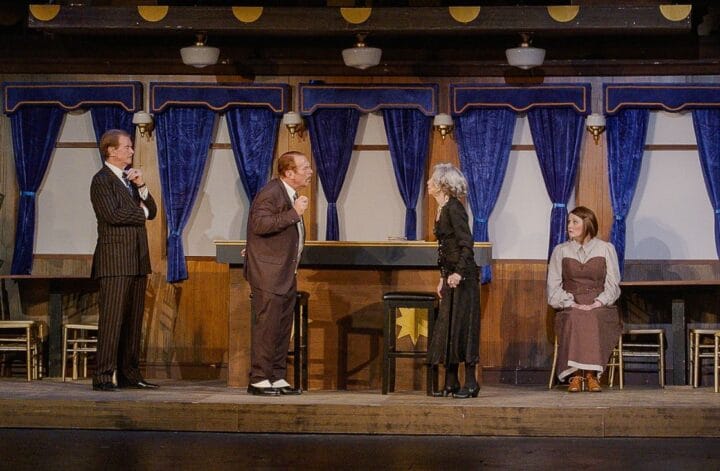Currently in its 78th season, the Delray Beach Playhouse just wrapped a production of Agatha Christie’s Murder on the Orient Express, which ran March 21st through April 13th, and it brought to life one of Agatha Christie’s most-famous detective novels, of the same name. Featuring local South Florida talent, the company produces classic theater for the Delray community, situated right on the edge of Lake Ida. For those that have not been to one of hidden gem’s performances yet, I highly recommend making an evening out of their final production of the season: The Bridges of Madison County.
But back to the murder. I only knew there was a murder because the play has the word Murder in it and who doesn’t guiltily enjoy a riveting story about murder, so I decided to review this production of Agatha Christie’s Murder on the Orient Express. I gave it bonus points for being a train murder. Entering the theater, everything forebodes murder. The dimly-lit aisles that carve through the alphabetized rows of, quite-comfortable, seats slope down until they crash at the stage, or maybe it’s where the stage begins; a genesis in this atmosphere of murder. Bare against the black curtains. Hidden innards and secrets behind them. And this show’s best kept secret? Its set of first-class interiors in the Orient Express. The two-story marvel, one that’s almost too big for its container, became a character itself as clues and solutions appeared, became relevant, and became adrift in the snow.

The play opens with a mother and daughter’s silhouettes, cast against a shadowy, obscuring film that causes the viewer to squint. The pre-recorded audio that the actors mime to is beyond creepy, the giggle of an actress pretending to be a child, and as the mother’s shadow disperses into the shadows, a hulking shadow materializes and snatches the girl; to unenthused cries for help. This first scene, this one occurrence of fact in the slipstream, becomes the crux of the entire play. The plot of such a play that occurs halfway around the world from the setting of kidnapping and murder, on a train. I emphasize this scene in particular, as one in the second act that I will discuss momentarily, because when this play leaned into what was possible, not just to tell a mystery, but to immerse the audience into the eternities of dark thoughts that swirl around murder, it grabbed me by the collar.

My favorite scene came at the end, which slogged along like a train trying to gain traction in feet of snow, and it came as a defibrillating fresh breath. The protagonist, the detective Hercule Poirot (Todd Caster), at the height of his reveal as to the identity of the murderer, takes a step forward, away from the grand set, and he perches at the edge of the audience. The rest of the cast (Eric Purcell, Jamie Mattocks, Seth Ullian, Brian Shaer, Neil Evangelista, Elaine Levin, Rachel O’Hara, Amanda Lopez, Spensyr Bach, Sergio Fuenzalisa) assume positions in lines, facing the audience. The lights project only their live silhouettes while the detective is lit, and he is running through each facet of the case. When he gets to a particular part in the story that concerns a character, that character would then repeat the line, mimicking this process of memory. The break in the pattern, addressing the audience, inviting them to be in on the twist’s uncrimping, was absolutely the best part of Delray Beach Playhouse’s Agatha Christie’s Murder on the Orient Express.



